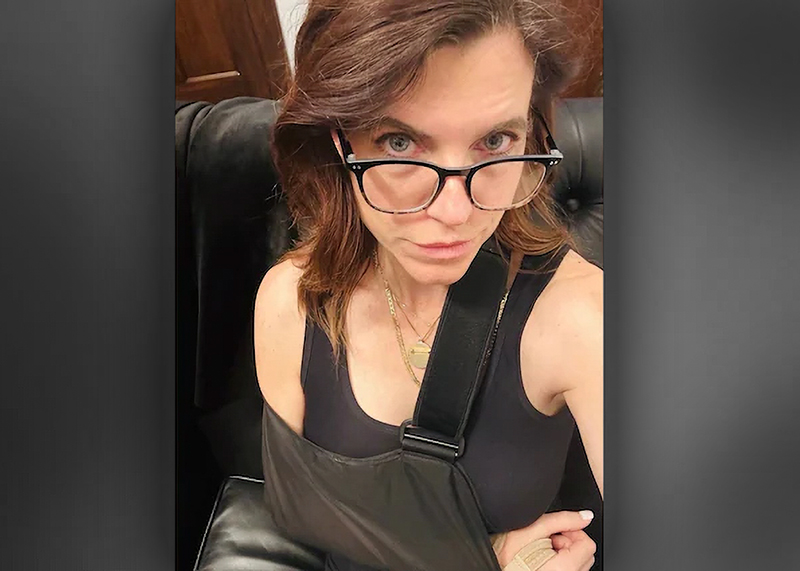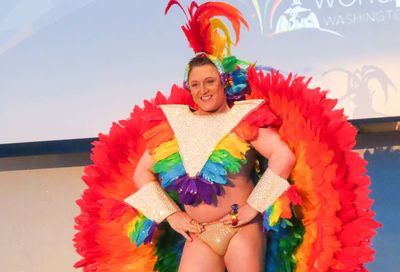Education Department recommends rescinding Obama-era school discipline guidance
Guidance sought to eliminate disproportionate punishments for students of color and LGBTQ youth under "zero-tolerance" policies

A federal commission led by Education Secretary Betsy DeVos is recommending rescinding Obama-era guidance that was intended to reduce racial discrimination in how students are disciplined for various infractions.
The Federal Commission on School Safety, created in the wake of the mass shooting at Marjorie Stoneman Douglas High School in Parkland, Fla., in February, has issues several recommendations aimed at disciplining unruly or troubled students in order to lessen the likelihood of a Parkland-style massacre, including “partnering with local law enforcement in the training and arming of school personnel,” reports NPR.
Trump administration officials, including Education Secretary Betsy DeVos, are advising the repeal of the Obama administration guidance, which sought to move schools away from embracing “zero-tolerance” policies in order to reduce racial disparities and promoted alternatives to suspension and expulsion.
DeVos and others within the administration say that the Obama-era guidance advising less severe punishments for misbehavior has cowed teachers and administrators into silence, making them less likely to take decisive action when students resort to violence or exhibit behavior that raises “red flags,” as Parkland shooter Nikolas Cruz had in the weeks preceding the shooting.
But statistics have shown that students of color, as well as students with disabilities and LGBTQ students, are more likely to be punished more severely than their white counterparts, regardless of the severity of their infraction, in schools that embrace zero-tolerance policies on violence. For example, if transgender or gender-nonconforming students of color are attacked and fight back, even to defend themselves, they are punished as severely as their aggressors.
As a result, supporters of the Obama-era guidance argue, zero-tolerance policies have the unintended effect of pushing historically marginalized or disenfranchised students out of the classroom and potentially out of a school altogether. Schools with a preponderance of low-income students and students of color are also more likely to see an increased police presence on campus.
A growing body of research shows that being suspended, expelled, or arrested at school — even once — is linked to higher dropout rates and lifelong negative consequences. And those consequences continue to be disproportionately doled out against marginalized communities. For example, statistics from 2014 showed that black girls were six times more likely to be suspended for disruptive or unruly behavior than their white counterparts.
In addition, advocates of gun reform measures were frustrated after DeVos said that looking at gun control measures would not be a priority of the commission. In the final report, the sole recommendation having to do with gun control was calling for the expansion of “extreme risk protection orders,” which would allow household members or police to seek the removal of firearms from people who are mentally disturbed.
The commission’s recommendations mark the third time that DeVos, as Education Secretary, has advocated rescinding an Obama-era policy designed to protect the civil rights of various students. Almost immediately after taking office in 2017, DeVos oversaw the rollback of protections that allowed transgender students to be treated according to their gender identity. She also pushed the Department of Education to narrow the definition of sexual harassment under Title IX to the point where schools would not investigate alleged sexual harassment or sexual assault except in the most egregious of circumstances.
Key LGBTQ groups blasted DeVos for suggesting the guidance be rescinded, noting that a return to zero-tolerance policies, or even casual disregard for the disproportionate punishments levied against students based on their race, has the effect of criminalizing marginalized groups in school.
“From day one of her tenure, Betsy DeVos has sought to undermine the safety, dignity and civil rights of students of color, LGBTQ students, students with disabilities and survivors of sexual assault,” David Stacy, the Human Rights Campaign’s director of government affairs, said in a statement. “While the revocation of this guidance would not change federal civil rights laws, this dangerous action would embolden discriminatory practices that push students of color, including LGBTQ students of color, out of the classroom.”
“This is yet another dangerous step in this administration’s ongoing efforts to eviscerate critical civil rights protections in our schools. By undoing guidance designed to improve school climate and support our most vulnerable students, the Commission is both dismantling effective policy and failing to address the issue of school safety,” said Eliza Byard, the executive director of GLSEN, which condemned the commission’s recommendations in a joint statement with the National Black Justice Center, the National Center for Transgender Equality, and PFLAG National.
“Early in her tenure, Secretary DeVos asked to be judged on her actions, and as advocates for LGBTQ issues in education, we have been monitoring her closely,” Byard added. “Based on her actions so far and those of the Federal Commission on School Safety today, we must ask: what would she have us say about her willingness to ignore the systemic impact of racism, bias, and inequality in our schools?”
According to a study by GLSEN, in 2015, almost two-thirds of LGBTQ students were subjected to some form of discipline, a significantly higher rate than their non-LGBTQ peers. Additionally, LGBTQ students of color were disproportionately impacted by those practices compared to their LGBTQ white counterparts. Students with disabilities were also routinely punished at higher rates than students without disabilities.
“In my experience as a dropout recovery educator — and the parent of a transgender person — I know that rolling back guidelines implemented to protect marginalized students will only marginalize them further,” Marsha Aizumi, a national board member of PFLAG, said in a statement. “In fact, harsh, unfair, discriminatory discipline practices hurt the very people we are aiming to help.
“Every time a student who is harassed or bullied is disciplined along with the students who were actually doing the harassing, they become further victimized,” she added. “In order to be successful, youth of color and LGBTQ+ youth need to believe that they have people championing them, valuing them and respecting them, not discriminating against them. This is the only way we can give marginalized students the hope they need to get through and thrive.”
Support Metro Weekly’s Journalism
These are challenging times for news organizations. And yet it’s crucial we stay active and provide vital resources and information to both our local readers and the world. So won’t you please take a moment and consider supporting Metro Weekly with a membership? For as little as $5 a month, you can help ensure Metro Weekly magazine and MetroWeekly.com remain free, viable resources as we provide the best, most diverse, culturally-resonant LGBTQ coverage in both the D.C. region and around the world. Memberships come with exclusive perks and discounts, your own personal digital delivery of each week’s magazine (and an archive), access to our Member's Lounge when it launches this fall, and exclusive members-only items like Metro Weekly Membership Mugs and Tote Bags! Check out all our membership levels here and please join us today!

























You must be logged in to post a comment.